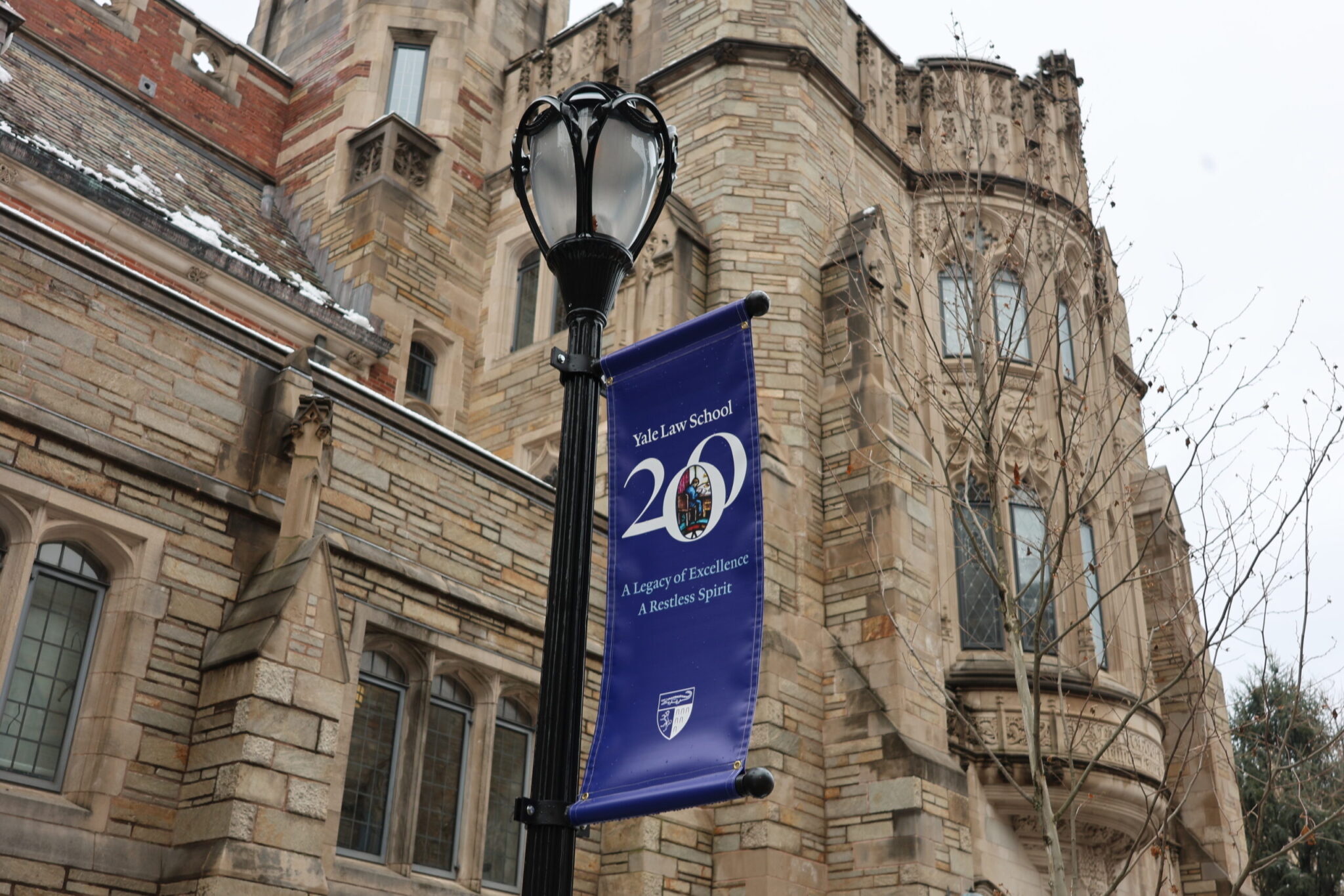Law School clinic files brief to combat intentionally false statements about voting
Yale Law School’s Media Freedom and Information Access Clinic submitted an amicus brief in the appellate case United States v. Mackey, aiming to show how civil rights law can prosecute intentionally false statements on voting mechanics.

Samad Hakani, Photography Editor
Yale Law School’s Media Freedom and Information Access Clinic filed an amicus brief on Feb. 12 in United States v. Mackey, a case currently at the Second Circuit Court of Appeals. The case involves an influential social media user convicted of attempting to convince voters to believe they could cast their votes through a false voting mechanic.
The case centers on claims that Douglass Mackey, a social media influencer on X, formerly known as Twitter, made during the 2016 presidential election campaign. Mackey, who was known to his 58,800 followers as Ricky Vaughn, repeatedly tweeted false claims to supporters of former Secretary of State Hillary Clinton LAW ’73 that they could cast their ballots via text message in the weeks leading up to the election.
Mackey was convicted by a New York jury in March 2023, ordered to pay a $15,000 fine and charged with violating Section 241, which prohibits conspiring to “injure” individuals’ federal rights or privileges, including the right to vote. He was sentenced to seven months in prison and appealed his conviction to the Second Circuit.
The YLS Media Freedom and Information Access Clinic filed its amicus brief in collaboration with Protect Democracy, a nonpartisan anti-authoritarian organization, on behalf of election law expert and UCLA School of Law professor Richard Hasen. The brief argues that a Reconstruction-era civil rights law can be utilized to prosecute deliberate misinformation regarding voting procedures, while still upholding the First Amendment’s right to freedom of speech.
“Section 241 properly construed does punish purposeful lies about when, where, or how people vote and is not overbroad,” the brief reads. “It prohibits, among other things, conspiracies to ‘injure … any person … in the free exercise or enjoyment of any right or privilege secured to him by the Constitution or laws of the United States.’”
According to Tobin Raju, Craig Newmark Clinical Fellow at the MFIA clinic, the issue of figuring out how laws can grapple with disinformation is something members of the clinic have been thinking about.
Raju told the News that Section 241, initially crafted to address resistance to Reconstruction in former Confederate states, presents a distinct application in this scenario due to the relatively recent emergence of X and other social media platforms. He said that despite the new technological landscape, historical precedents demonstrate that the use of this law to prosecute lies about election procedures is proper. Raju added that intentionally deceptive practices have previously been subject to criminalization under this statute.
“It’s about applying prior precedent in similar situations, just to modern technology,” Raju said.
Raju explained that when Mackey appealed his conviction to the Second Circuit, the case was placed on an expedited track — meaning that briefing moved relatively quickly and that it will be heard for oral argument 0n April 5.
Raju said that students in the clinic took a hands-on approach to the work, being involved in tasks ranging from research assistance to drafting portions of the brief.
“I really appreciated the opportunity to work on this case because I think combating election disinformation is going to be key to preserving our democracy, this year and beyond,” Victoria Maras LAW ’25, an MFIA clinic member who worked on the brief, told the News. “As a former Field Organizer, I know how important it is to get the right information out to voters, and, by the same token, how harmful it can be when misinformation spreads.”
Maras said she was grateful that this brief can show how people who conspire to spread false election information can be held accountable without threatening First Amendment free speech rights.
Another MFIA clinic member, Ben Menke LAW ’25, told the News that delving into the history of Section 241, which was passed in 1870, led him to examine transcripts of debates in Congress during that time. Through this research, Menke said that he uncovered the motivations of the legislators who first enacted the law, as well as the legal opinions of the judges who applied Section 241 at the time.
“Our brief offers clarity on the proper way to construe Section 241, and we show that the law is consistent with the First Amendment,” Menke told the News. “Bad actors are finding it easier to spread knowingly false information to interfere with the right of the people to vote. Enforcing Section 241 is one way the federal government can respond to this threat.”
In a statement to the News, James Lawrence, Mackey’s attorney, said that their core argument in defense of Mackey is that he did not have fair notice, required by the Fifth Amendment, that his conduct violated “clearly established” law.
Lawrence claimed that the amicus brief uses a Supreme Court case about a different law to argue that a rarely used legal concept, not accepted in many state courts and never applied in New York, should be turned into a federal crime for misleading election information.
“If a team of federal prosecutors never came up with this convoluted argument after pursuing this case for more than three years … how could Douglass Mackey be expected to know his conduct violated Section 241 in 2016?” Lawrence wrote in the statement.
The MFIA clinic declined to comment on Lawrence’s statement.
Raju expressed curiosity about the Court’s ruling, especially since the case will be heard during an election year.
“I think it’s an interesting case because I imagine we’ll probably be seeing similar issues in the lead-up to this next election,” Raju said.
The Second Circuit Court of Appeals oversees the states of Connecticut, New York and Vermont.







